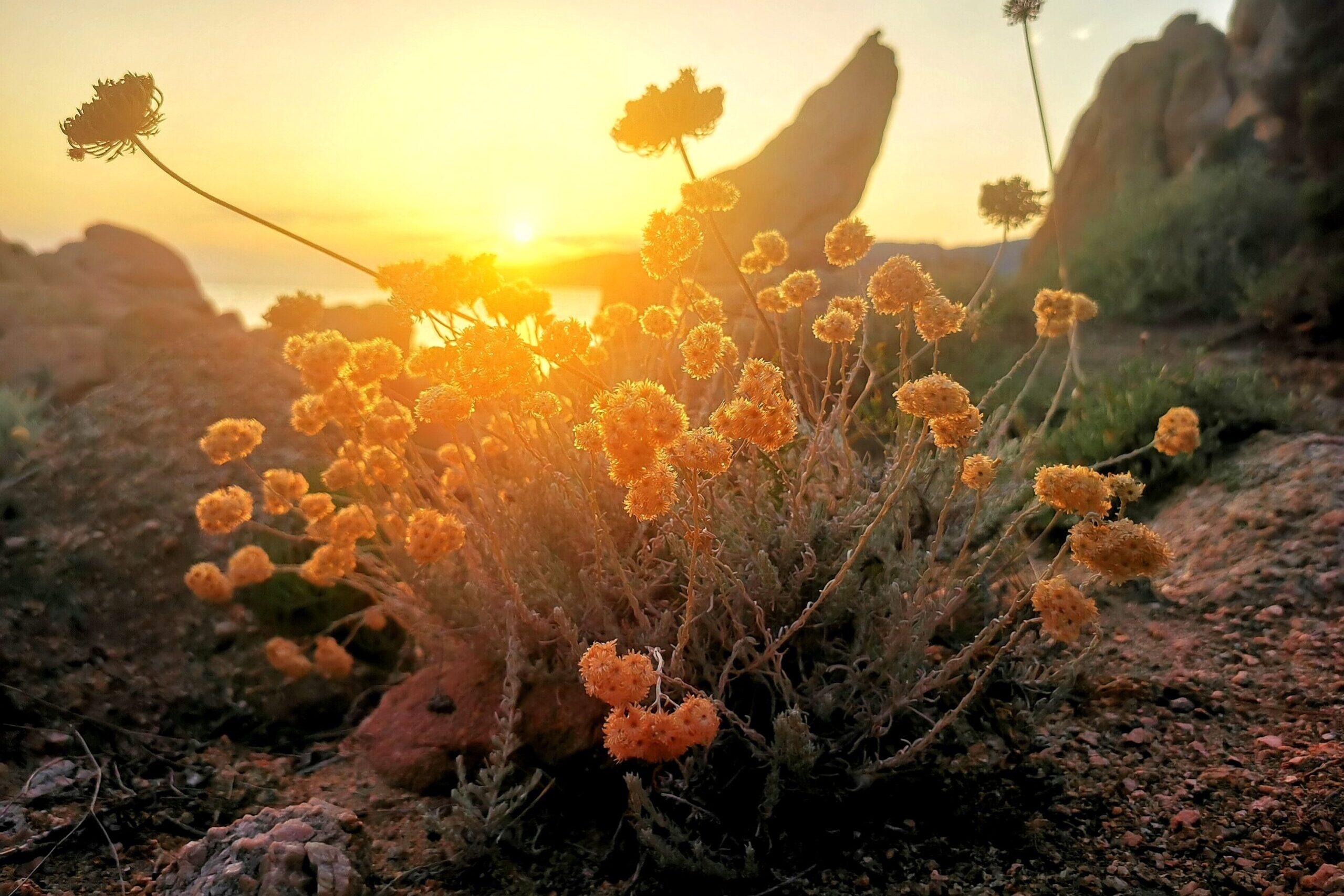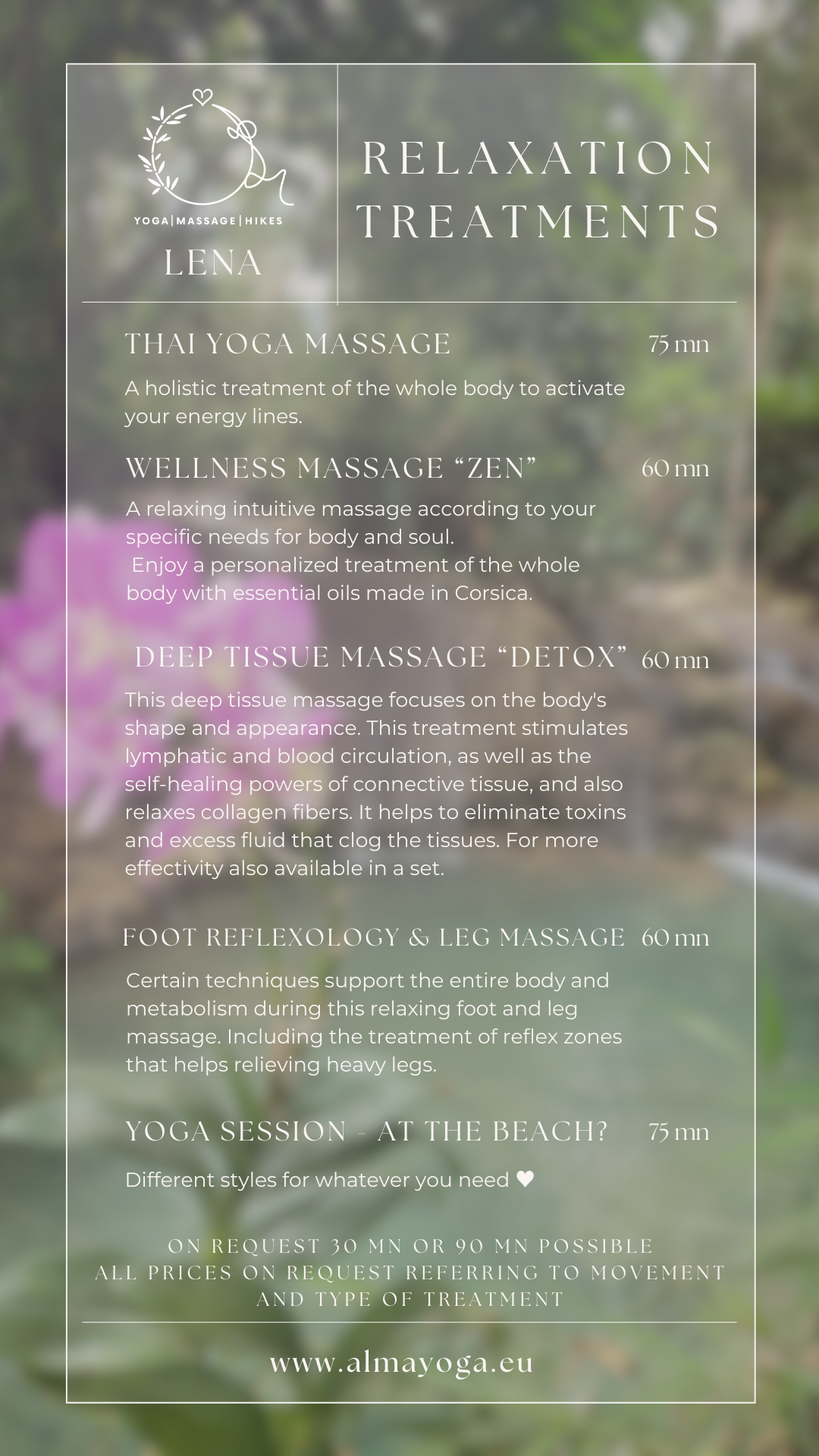My grandmother introduced me to the connection with nature and showed me all the medicinal herbs and plants and their processing in the immediate vicinity. In my private life, I still collect everything I can identify and use. For example, I treated my Lyme disease with rockrose and the pathogens are no longer detectable in my blood (this is not medical advice; please always consult a doctor immediately if you suspect Lyme disease). Mother Nature has everything we need! However, our plants have a lot to offer not only orally but also when applied to the skin. In Corsica, I was able to work for a while at Essences Naturelles Corse and learned more about the production, use and effects. I like to use the oils and aromatic oils in my massages and recommend using them carefully at home too.
What are essential oils?
Essential oils are natural, highly concentrated plant extracts obtained from the various parts of a plant, such as flowers, leaves, bark or roots. They contain the “essential” aromas and active ingredients of the plant, which are responsible for both the fragrance and the healing properties. They are mainly produced by steam distillation or cold pressing. Essential oils not only have a pleasant, often calming or invigorating effect on the mind, but also offer many health benefits that make them a popular agent in aromatherapy, massage and body care.
Do something good for your body so that your soul will want to live in it! – Teresa of Avila, nun from the 16th century.
Origin and production of essential oils
The production of essential oils is a complex process in which plant materials, such as flowers, leaves or bark, are distilled or pressed under controlled conditions to extract the essential oils. Steam distillation is the most common method, in which water vapor breaks down the plant components and the essential oils are vaporized. These vapors are then condensed and the oil is separated from the water. The hydrolates are also known as floral waters and are also full of active ingredients and have the same qualities as essential oils, but their effect is weakened as they are highly diluted and therefore also suitable for children. Cold pressing is also used, particularly with citrus fruits, to extract the oil from the peel. The origin of the plants is decisive for the quality of the essential oil, and many of the best essential oils come from countries with traditional cultivation, such as France, Italy or India.
Use of essential oils in massage and aroma oil therapy
Essential oils play a central role in massage and aromatherapy, where they help to promote relaxation, pain relief and emotional balance through their effect on the body and mind. In massage, essential oils are often mixed with a carrier oil and applied to the skin. The oils are not only absorbed through the respiratory tract by the scent, but also through the skin, which helps to heal tension and pain.
In aromatherapy, the scent of essential oils is used via a diffuser or directly by inhalation. Certain oils such as lavender or camomile have a calming effect and help with sleep problems or anxiety, while citrus oils such as bergamot and orange have a mood-lifting and invigorating effect.
Use in daily body care
Essential oils are not only extremely effective in therapeutic applications, but also in daily body care. They can be found in many natural cosmetics and skincare products as they can provide the skin with valuable nutrients, improve skin condition and promote general well-being. Tea tree oil, known for its antibacterial properties, is often used in skincare products to treat acne. Meanwhile, rose oil and lavender oil nourish the skin and have a soothing effect on irritated areas. As the skin is our largest organ and everything that touches it penetrates our organism, most essential oils need to be applied to the skin in diluted form. Essential oils are full of active ingredients, so careful handling is recommended.
Essential oils to support health
All essential oils contain the power of nature. “There’s an herb for every ailment.” And essential oils offer many other health benefits and can increase general well-being. They can help treat colds, headaches and sleep disorders or stimulate circulation. In folk medicine, they have been used for centuries to support the immune system and alleviate complaints such as nausea or digestive problems. Certain essential oils have an anti-inflammatory effect and strengthen the immune system, making them a natural support for health.
Essential oils in cosmetics
In the cosmetics industry, essential oils are particularly valued for their antimicrobial, antioxidant and healing properties. They help to nourish the skin, slow down the ageing process and improve the overall appearance of the skin. Many anti-ageing products contain essential oils such as rosemary, which fight free radicals and protect the skin from damage through their antioxidant effects. Essential oils such as rosemary or peppermint are also commonly found in hair care products as they can promote hair growth and revitalize the scalp.
Advantages over medicines and conventional cosmetics
Compared to conventional medicines and cosmetics, essential oils offer a natural alternative with fewer side effects. Many medications can cause unpleasant side effects such as fatigue or stomach problems, whereas essential oils are generally well tolerated and treat the symptoms in a targeted manner. They offer a holistic therapy that addresses the body, mind and soul without resorting to synthetic substances. In skin care, the use of essential oils in natural cosmetics is beneficial as they do not contain any aggressive chemicals and therefore do not harm the skin.
Precautions when using essential oils
Despite their many benefits, essential oils should be used with caution. As they are highly concentrated, they should always be diluted with a carrier oil to avoid skin irritation. Some essential oils are not suitable for pregnant women or young children. In addition, people with certain pre-existing conditions, such as asthma or epilepsy, should consult a doctor before use. An allergic reaction is also possible, which is why a patch test is recommended before use. When using undiluted essential oils, be sure to take a short break after a few days. Please seek professional advice beforehand as to whether this oil meets your needs and how to use it.
The best-known Corsican plants and their essential oils
Corsica is known for its unique flora and the healing essential oils extracted from its native plants. The most famous of these include immortelle, myrtle and rosemary.
- Immortelle (Helichrysum italicum): This golden flowering herb has a strong anti-inflammatory and healing effect. It is often used in essential oil therapy to treat scars, skin irritations and inflammations. Immortelle is known for its regenerative properties and is also used in skin rejuvenation and to support skin structure.
- Myrtle (Myrtus communis): The essential oil of myrtle has calming, antiseptic and cleansing properties. It is particularly used for respiratory illnesses such as coughs or colds and also promotes mental clarity. Myrtle also has a balancing effect on emotional well-being and helps to combat anxiety and stress.
- Rosemary (Rosmarinus officinalis): Rosemary is a powerful oil that promotes blood circulation and increases mental alertness. It is often used to promote hair growth, treat muscle pain and improve concentration. Rosemary also has an antioxidant effect and protects cells from harmful free radicals.
These Corsican plants are not only known for their healing properties, but also contribute to improving general well-being. Their essential oils are an integral part of naturopathy and cosmetics and are valued worldwide.








